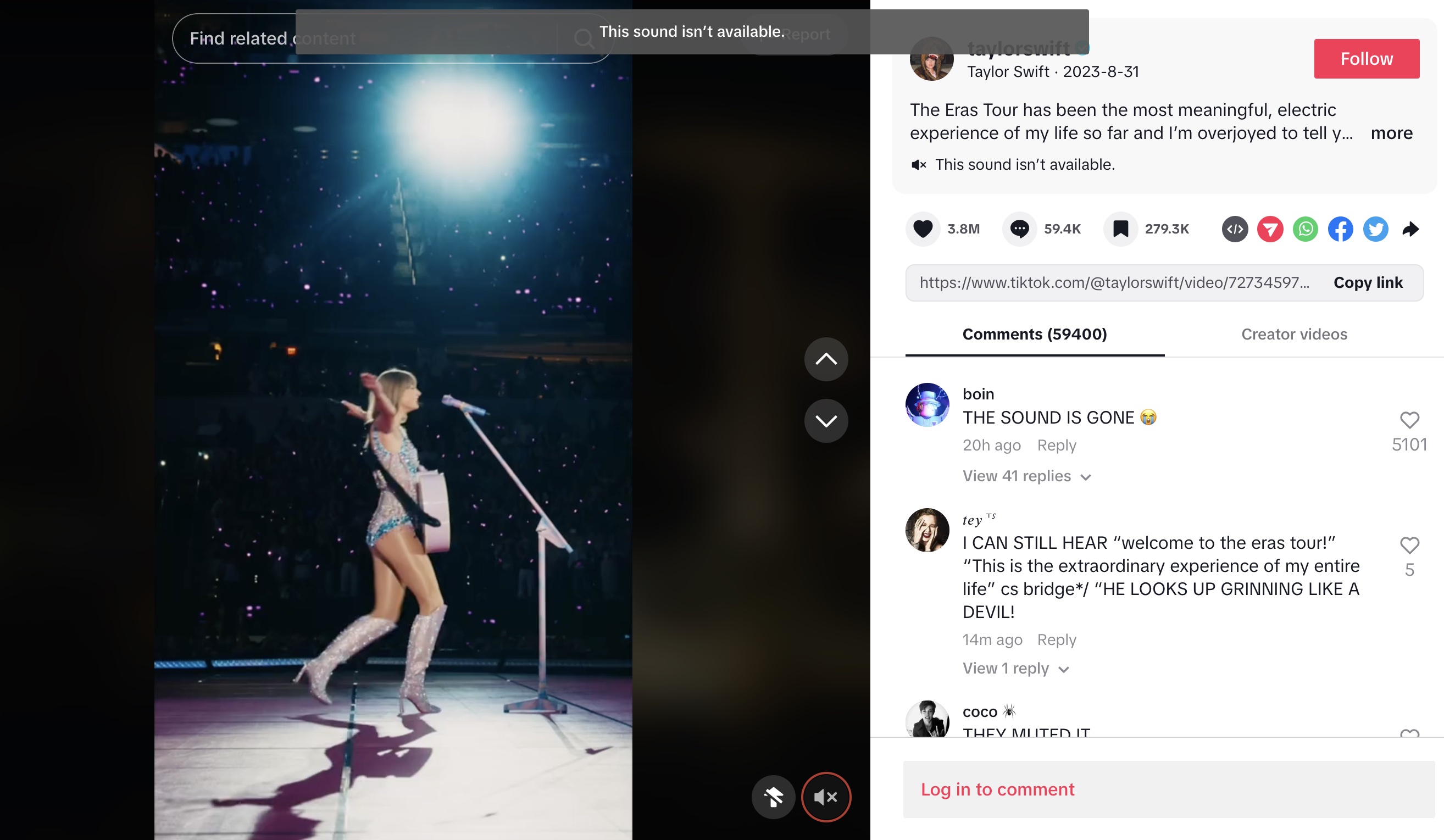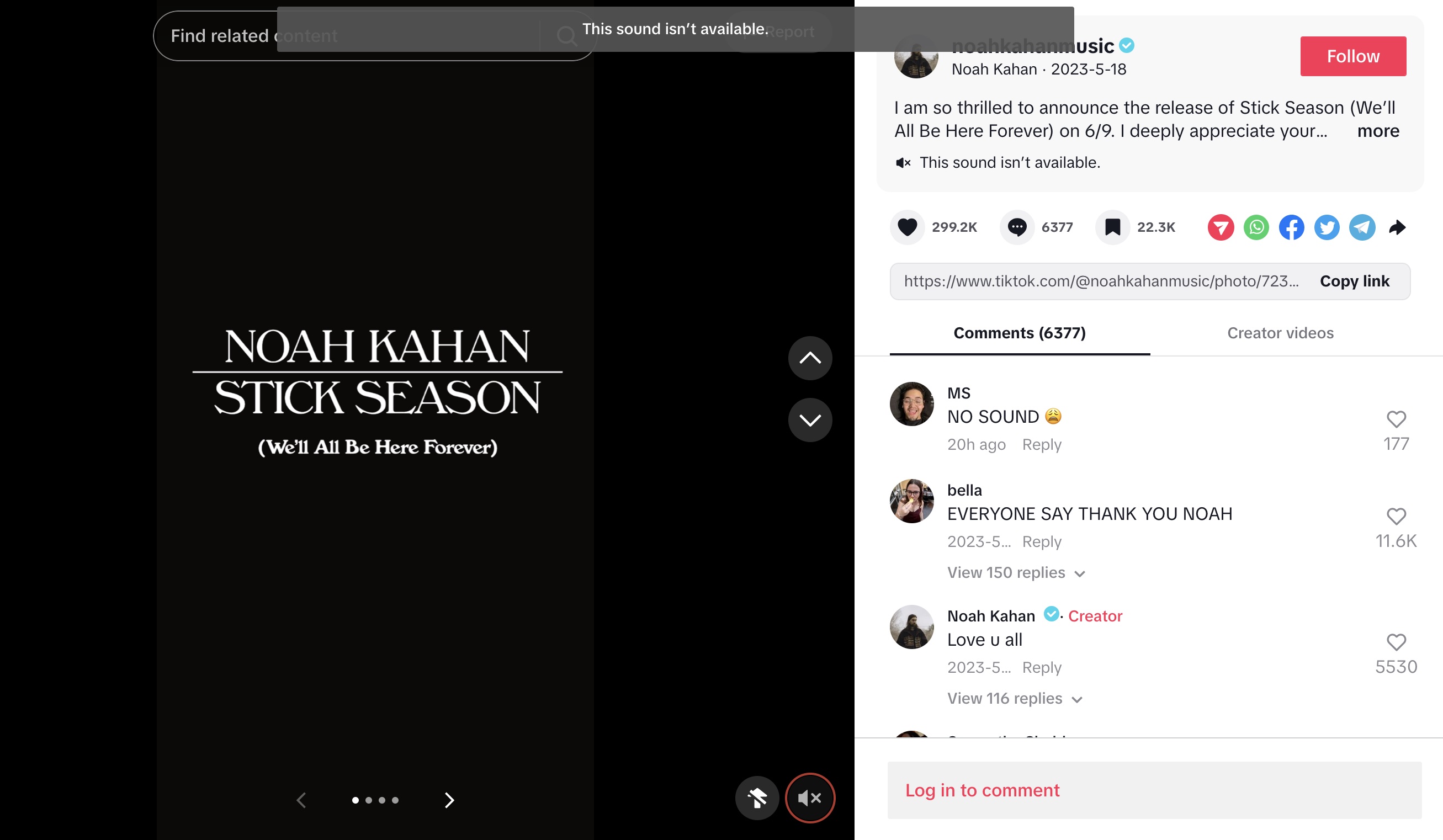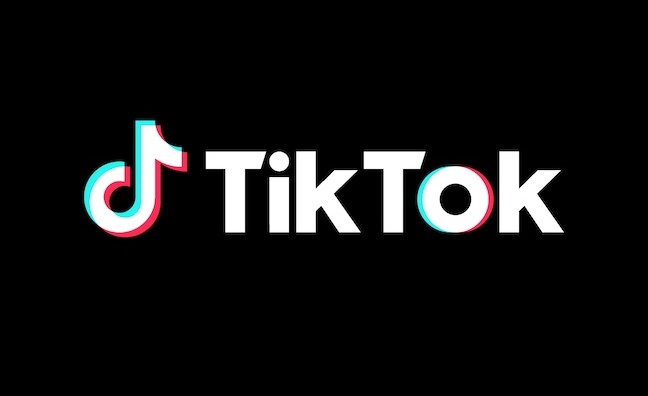TikTok users have found the platform a very different experience so far this month.
Since the war of words between UMG and TikTok over their licensing renewal dispute, recordings by the major label’s artists have been removed from the short form video platform.
What’s more, this is just the start. The failure to agree a new licence agreement on January 31 also affects Universal Music Publishing Group repertoire. If no deal is agreed in the weeks ahead, it means that songs by artists and songwriters signed to the publishing company will also be removed from the platform.
A UMPG takedown would affect many other artists on other major labels who are signed to the publisher, or who work with co-writers who are part of the UMPG stable. That could already be throwing artist campaigns into a state of uncertainty.
TikTok is not a music streaming platform, it’s a social video app; and the licensed songs featured on videos are limited to 60 seconds. But TikTok has become the dominant platform for artists to reach younger fans – a recent IFPI report showed that short form video is the top method for 16-24 year-olds (82% of those surveyed) to engage with music, versus 72% for audio streaming, and 68% for video streaming platforms.
For now, those UMPG songs remain on TikTok, but the clock is running down as the end of the publishing agreement means they will have to be removed by the end of the month.
The scale of TikTok’s global reach – more than a billion users globally – is part of the reason for the breakdown in licensing talks with UMG.
In an open letter, Universal Music Group said that “TikTok proposed paying our artists and songwriters at a rate that is a fraction of the rate that similarly situated major social platforms pay,” and it noted that only 1% of total revenue comes from TikTok despite it having a “massive worldwide user base”.
“It is sad and disappointing that Universal Music Group has put their own greed above the interests of their artists and songwriters,” TikTok, owned by Chinese parent company ByteDance, responded in a similarly robust statement, which also noted the platform’s offering as a “free promotional and discovery vehicle for their talent”.
At a time when major labels are looking to maximise revenue streams beyond audio streaming, where growth may be peaking in some markets, the idea that they should be grateful for a promotional platform did not go down well.
TikTok still argues that artists should be grateful for the ‘free promotion’
UMG
UMG bristled at that response from TikTok, and has now issued a follow-up statement.
“Our agreements with TikTok have expired because of TikTok’s unwillingness to appropriately compensate artists and songwriters, protect human artists from the harmful effects of AI, and address online safety issues for TikTok’s users,” said UMG in a post-expiry comment.
“In fact, TikTok’s own statement perfectly sums up its woefully outdated view: Even though TikTok (formerly Musical.ly) has built one of the world’s largest and most valuable social media platforms off the backs of artists and songwriters, TikTok still argues that artists should be grateful for the ‘free promotion’ and that music companies are ‘greedy’ for expecting them to simply compensate artists and songwriters appropriately, and on similar levels as other social media platforms currently do.
“TikTok didn’t even attempt to address the other issues we raised regarding harmful AI and platform safety. It’s no surprise that artist rights advocates are speaking out in support of our action.”
The row coincided with a Senate Judiciary Committee Hearing in the US (January 31) on online child sexual exploitation, which was addressed by tech leaders including TikTok CEO Shou Chew.
UMG’s battle with TikTok caught the industry by surprise, as there had been no sense of an impending breakdown in talks. Other majors and independents have recently renewed their deals, although Warner Music CEO Robert Kyncl last summer described the platform as “embattled” over its music licensing model.
Since TikTok began removing UMG content from January 31, users on the platform have noticed the absence of their favourite music from superstar artists on the major. On TikTok accounts for acts including Taylor Swift, Billie Eilish, Noah Kahan and Ariana Grande, for example, fans have posted ‘the sound is gone’ in the comments thread and a message on the platform reads ‘This sound isn’t available’.


Existing videos by creators featuring UMG repertoire will be muted, while new videos will not be able to be made with those tracks, which have now disappeared from the platform’s general music library.
Sophie Ellis-Bextor’s catalogue hit Murder On The Dancefloor has been propelled to near the top of the UK chart thanks to its Saltburn sync and subsequent virality in TikTok, but has now been removed.
While there has been little industry comment outside of those affected and the organisations UMG alluded to (Future of Music Coalition, Artists Rights Alliance), some UMG-signed artists have responded to the move.
Noah Kahan, who has a long-running No.1 with Stick Season, said: “I won’t be able to promote my music on TikTok any more … I’ll probably be OK, right? I’ll probably land on my feet, right? Right?”
Metro Boomin posted on X: “I love the creativity and appreciation the kids show for the music on TikTok but I don’t like the forced pandering from artists and labels that results in these lifeless and soulless records.”
The industry now awaits progress on a deal or the removal of UMPG content by the end of February or early March.
In a separate letter to its songwriter community on January 31, Universal Music Publishing Group wrote: “We are reaching out to trusted and valued partners throughout the globe to inform you that, despite our good faith efforts over the last several months, we are at an impasse in reaching a licensing agreement with TikTok and our current agreement ends tomorrow.
“Despite TikTok’s widespread use of music, its exponential revenue growth, and the massive increase in its user base in such a short period of time, TikTok insists on paying our songwriters at a fraction of the rate that similarly situated major social media platforms pay – and without any material increase from our prior agreement. TikTok tried to bully us into accepting their proposal by selectively removing the music of certain developing artists. This is unacceptable.
“We will always fight for our songwriters and protect the creative and commercial value of music. We believe our greatest responsibility to you is to make sure your songs are appropriately compensated, on platforms that respect human creativity, with your music in environments that are safe for all and effectively policed. We take this responsibility very seriously, and we will never stray from our commitment to you.”
Of course, this could be a temporary measure that gets resolved quickly, or it could rumble on and impact the wider industry.
If we were to lean towards the optimistic side, look at YouTube. The video streaming platform used to be the subject of opprobrium over its so-called ‘value gap’ in relation to music, but it has just celebrated a 100 million-strong subscription model.
Among the first to congratulate YouTube was UMG CEO & chairman Sir Lucian Grainge.
While there are clearly important issues at stake in the licensing negotiations, it’s in the interests of both the US music company and the Chinese tech firm to settle their differences.








